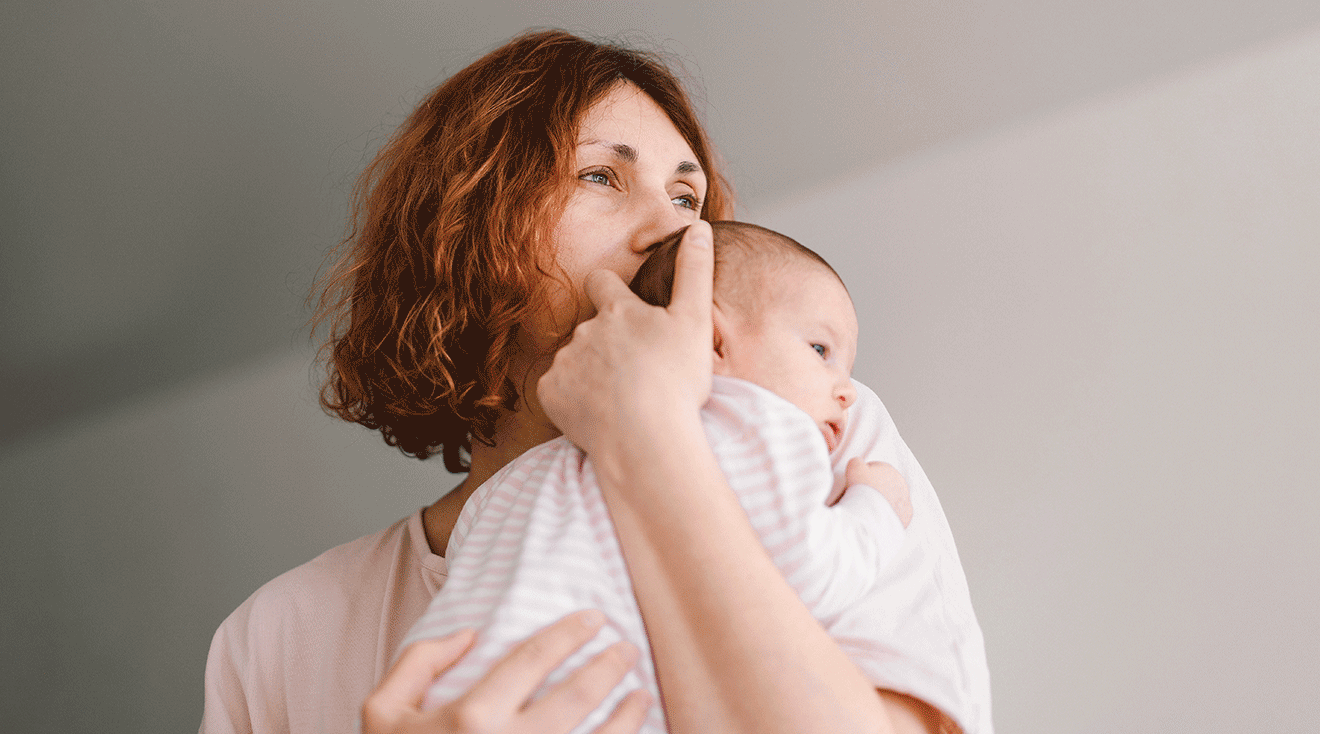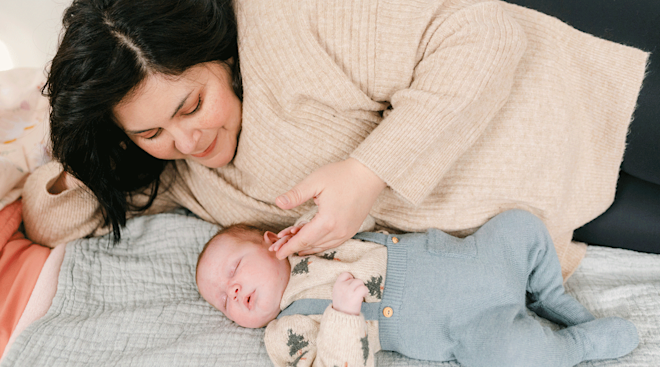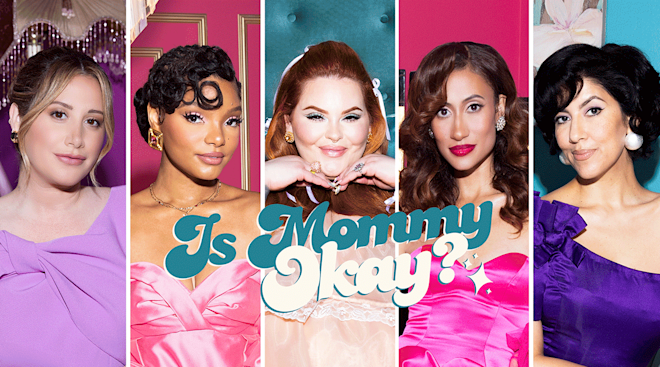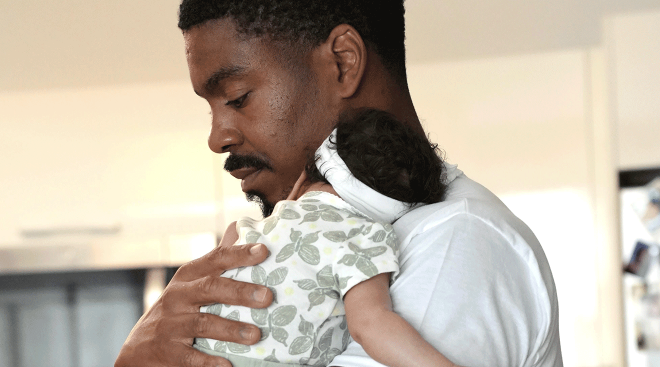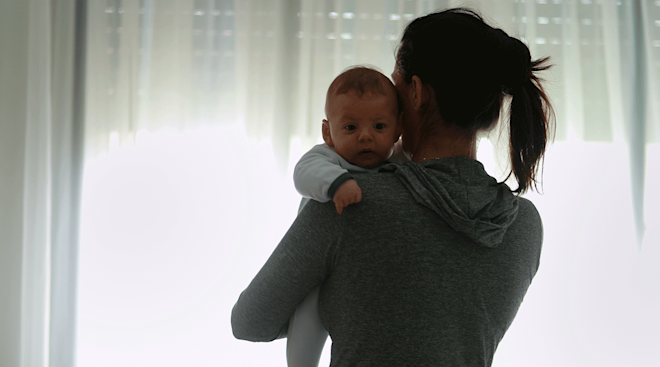The Baby Blues Survival Guide
You excitedly count down the weeks until you meet baby, expecting to feel euphoric once that moment arrives. But by the time you come home from the hospital, you feel…“eh.” What gives? Say hello to the baby blues. Before you give yourself the “worst mom ever award” for feeling down after giving birth, know that this is completely normal. According to Cleveland Clinic, as many as 50 to 75 percent of new moms and birthing people experience baby blues. Considering that you just spent 40 weeks growing a human in your belly and then went through all the trials of labor and delivery, only to embark on a sleepless marathon of feedings and diaper changes, it makes sense that you’re not exactly at your best. Ahead, learn all about baby blues—including the difference between baby blues vs postpartum depression, and when to reach out to your doctor.
Baby blues are mood changes, such as irritability and sadness, that typically happen in the first few days after having a baby, according to March of Dimes. They often set in two to three days after baby is born, and last for less than two weeks. The reality of attending to a new baby that monopolizes all your time and energy can leave you feeling irrationally upset and frustrated. Baby blues usually go away on their own—but if yours don’t, be sure to check in with your healthcare provider.
Besides the obvious baby blues causes—mental and physical exhaustion—there are physiological triggers as well. These include:
- Hormonal shifts and chemical imbalances. During and after pregnancy, hormonal changes naturally make you more vulnerable to mood shifts. Remember feeling super-emotional during the first trimester (thank you, progesterone)? Cortisol, the stress hormone, gradually rises during pregnancy, peaks at delivery and drops to baseline level within the first three days postpartum, according to BMC Pregnancy and Childbirth. Hormones aren’t the only things to blame when it comes to the baby blues, however; research shows that an increase of monoamine oxidase (MAO-A), an enzyme that helps break down “feel-good” chemicals like serotonin and dopamine in the brain, may work as a catalyst in that uneasy feeling. Immediately after delivery, the new mom’s estrogen production plummets to pre-pregnancy levels, says Michael Silverman, PhD, assistant professor of psychiatry at Icahn School of Medicine at Mount Sinai in New York City. Simultaneously, MAO-A increases and essentially destroys those feel-good chemicals in the brain.
- Inflammation. Your body undergoes tremendous change and repair during pregnancy—you just grew and birthed a baby, after all. As a result, “there’s a profound immunologic response,” Silverman says. “And we know there’s a strong relationship between inflammation and depression.” As with an extreme case of the flu, wear and tear on your body can have an effect on your brain, leaving you crabby and in cognitive disarray—what we call the baby blues.
Most women and birthing people are just trying to survive after being catapulted into motherhood full force. Not surprisingly, the feelings of worry and fatigue that arise are natural. They also underlie the most common baby blues symptoms. These include, according to the American Pregnancy Association (APA):
- Crying for no apparent reason
- Irritability
- Restlessness
- Anxiety
- Fatigue
- Insomnia
- Sadness
- Other mood changes
- Poor concentration
One way you can tell whether you have the baby blues or postpartum depression is that with the baby blues, you should see an improvement in mood in about two weeks, notes the APA. Without this relief, or with a worsening of symptoms, it’s possible you might have postpartum depression.
As many as one in seven new moms experiences postpartum depression, according to the American Psychological Association—and it can hang around for months and even years if left untreated. “It often occurs in the first three months postpartum and may have started during pregnancy,” says Tiffany Moore Simas, MD, an associate professor of ob-gyn, pediatrics and psychiatry at the University of Massachusetts Chan Medical School in Worcester, Massachusetts.
While baby blues symptoms are typically mild, postpartum depression is less manageable. “The baby blues are temporary and manageable,” says Sherry Ross, MD, an ob-gyn and women’s health expert at Providence Saint John’s Health Center in Santa Monica, California, and author of She-ology and She-ology, the She-quel. “Postpartum depression makes all the desperate feelings more intense and debilitating to a point where you’re unable to perform your daily routine, including caring for baby.”
The symptoms for postpartum depression include, according to March of Dimes:
- Overpowering guilt, sadness or panic
- Frequent crying, anxiety and worrying
- Feeling hopeless or like you’re not good enough
- No energy and finding it hard to focus
- Weight loss, weight gain and appetite changes
- Scary thoughts about yourself or baby
If you notice any of these behaviors, talk to your doctor right away—especially if you have a history of depression. “The consequences to the mother and the child are not worth ‘waiting and seeing’ whether the baby blues go away on their own,” Silverman says. “Once real depression hits, the mother’s not in a position to get help on her own.”
Unless you’re dealing with unbearable and disruptive baby blues symptoms, you may be able to alleviate the baby blues with a few helpful coping techniques:
- Seek support. Without a strong social network of family and friends, it’s easy to feel helpless and alone. When you feel like everything is on you, even a minor annoyance, like yet another poopy diaper, can quickly lead to a full-blown breakdown. Seek out someone who can say, “‘I get it.” That should be your partner, but it can also include a best friend or another family member. When you have the baby blues, these people “let you be as emotional as you want,” Silverman says. And they help “facilitate the adjustment much quicker.”
- Build a mom network. Reach out to other parents from your prenatal classes. Chances are they’re going through something similar or, better yet, have already overcome the challenges of the baby blues and can offer solid advice. Pursue empathetic friends, since they’re most helpful during stressful times. Online communities are also great resources for connecting with moms who may also be grappling with the baby blues.
- Practice mindfulness. Staying in tune with yourself through mindfulness (awareness during a particular moment) is said to reduce the likelihood of postpartum depression, according to research. Engage in meditation or yoga, even if it’s just for a few minutes a day.
- Prioritize sleep. Deprive any healthy person of sleep, and you’ll notice moodiness. Deprive a new mom juggling everything, and you have potential chaos. To help lessen the baby blues effects, try to optimize your sleep hygiene.
- Set realistic expectations. Motherhood is often not how you dreamed it would be while you were pregnant. Once you’re home from the hospital you’ll likely feel scattered, so instead of trying to do things “just so,” focus on getting into a rhythm—even if that rhythm involves walking around like a zombie.
Again, if your baby blues symptoms last beyond two weeks, it’s important to reach out to your healthcare provider. “I would encourage any woman not to ask but tell her ob-gyn that she’s worried about her emotional state,” Moore Simas recommends. If you notice any of the signs of postpartum depression—such as overpowering guilt, sadness or panic, frequent crying, or thoughts of harming yourself or baby—be sure to contact your provider as well.
Doctors will typically wait after the two-week mark to start prescribing antidepressants and anti-anxiety medications to help moms manage their baby blues. “Keeping your postpartum routine and bonding rituals with baby is vital in the treatment process,” Ross says.
The symptoms of baby blues will typically lessen and disappear within two weeks after delivery, says the APA. If your symptoms become more severe or don’t improve, it’s important to get in touch with a medical provider.
After giving birth, it’s completely normal to experience mood swings, sadness and anxiety. It’s important to seek support and take care of yourself during this vulnerable time.
Please note: The Bump and the materials and information it contains are not intended to, and do not constitute, medical or other health advice or diagnosis and should not be used as such. You should always consult with a qualified physician or health professional about your specific circumstances.
Plus, more from The Bump:
Tiffany Moore Simas, MD, is an associate professor of ob-gyn, pediatrics and psychiatry at the University of Massachusetts Chan Medical School in Worcester, Massachusetts. She earned her medical degree from the University of Massachusetts Chan Medical School.
Sherry Ross, MD, is an ob-gyn and women’s health expert at Providence Saint John’s Health Center in Santa Monica, California. She’s the author of She-ology: The Definitive Guide to Women’s Intimate Health. Period. and She-ology, the She-quel: Let's Continue the Conversation. She received her medical degree from New York Medical College.
Michael Silverman, PhD, is an assistant professor of psychiatry at Icahn School of Medicine at Mount Sinai in New York City. He completed his post-doctoral training at Harvard University and a fellowship in cognitive neuroimaging at Weill Medical College of Cornell University.
Cleveland Clinic, Postpartum Depression, April 2022
March of Dimes, Baby Blues After Pregnancy, May 2021
BMC Pregnancy and Childbirth, Perinatal Maternal Depression and Cortisol Function in Pregnancy and the Postpartum Period: A Systematic Literature Review, May 2016
JAMA Psychiatry, Elevated Brain Monoamine Oxidase A Binding in the Early Postpartum Period, May 2010
American Pregnancy Association, Baby Blues
American Psychological Association, Postpartum Depression: Causes, Symptoms, Risk Factors, and Treatment Options, November 2022
Greater Good Magazine, University of California Berkeley, Can Mindfulness Help Reduce Postpartum Depression?, September 2017
Cleveland Clinic, Sleep Hygiene: 7 Tips for a Better Bedtime Routine, September 2023
Learn how we ensure the accuracy of our content through our editorial and medical review process.
Navigate forward to interact with the calendar and select a date. Press the question mark key to get the keyboard shortcuts for changing dates.
































